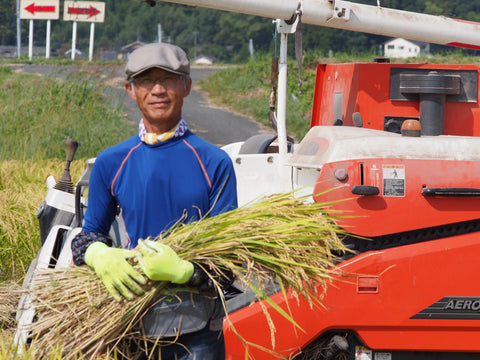Collection: Mr. Yusei Koike (Koike Farm)
Producer: Yusuke Koike
Production area: Kikuchi City, Kumamoto Prefecture
Main products: Rice, sweet potatoes, cucumbers, etc.
No pesticides used
Fertilizer use: None

Sticking to his beliefs in rice-producing Kikuchi
Shichijo-cho, Kikuchi City, Kumamoto Prefecture. This area is famous nationwide as one of the leading rice-producing areas in Kumamoto, and Mr. Koike grows rice and fields using natural farming methods.
He has been cultivating rice using natural farming methods for 38 years, since his father's generation.

Natural cultivation inherited from "Higo Mokkosu"
Mr. Koike practices natural farming near the famous Melon Dome in Shichijo-cho, Kikuchi City, Kumamoto Prefecture.
Mr. Koike comes from a family of farmers who have lived in this area for generations. The Koike family first started to use natural farming 38 years ago.
When Mr. Koike's father was still farming rice, he received a request from an acquaintance to "grow rice without the use of fertilizers or pesticides."
"My father was also instructing people on regular rice cultivation, but he received requests from customers, so one day he started growing rice without the use of fertilizers or pesticides." The Koike family began growing rice naturally, starting with just two tan (approximately 20m x 100m).
Since then, he has gradually expanded the area of his rice cultivation while switching to naturally grown rice for his own consumption, and now all of his rice paddies, covering 3 cho 2 tan (approximately 320m x 100m), are grown naturally.
His father, who was a rice cultivation instructor in the local area, had an extraordinary passion for rice farming and continued to work at the forefront of rice farming until he was 80 years old.
Until he took over the rice farming business 10 years ago, Koike was only allowed to play the role of supporting his father.
"From that time on, I had wanted to start growing naturally grown rice in earnest, but it wasn't that easy (laughs).
I was also a "mokkosu" (a stubborn person in the Kumamoto dialect), so I studied a lot about natural farming so that I wouldn't lose to my father."
Mr. Koike never received any technical instruction from his father and initially learned about natural farming on his own.
Even so, Koike says, "Just watching my father's dedication to rice farming taught me a lot."
Koike's father's presence was huge as he worked on natural farming. 
The best rice in the world: Sanda rice
Shichijo-cho, Kikuchi City, Kumamoto Prefecture, is one of Japan's leading rice-producing areas.
Within Shichijo Town, the rice fields in the Sunada area, sandwiched between the Kikuchi River and the Hazama River, are known as "Sunada rice."
Since the Edo period, "Sanda rice" has been called "the best rice in the world" and has a history of being presented as rice to the Shogunate and the Imperial family.
The characteristic of the Sunada area is its unique soil (sandy loam) that is mixed with sand created by the flow of the river.
Sandy loam is said to be a terrain that makes it difficult for nutrients to accumulate in the soil compared to other types of rice fields.
Therefore, although these conditions generally appear to be bad for rice growth, the rice plant desperately spreads its roots deeper and in all directions in order to absorb nutrients.
In addition, the sandy loam soil, which has a layer of pebbles in it, contains plenty of granite minerals that are ideal for growing rice.
These elements combine to produce Shichijo Town Sunada rice, which is said to be stronger, more vibrant, and tastier than regular rice.
"Because the soil is sandy, the yield is not that great, but I'm grateful to be able to grow rice here, where we can produce delicious rice."
Kikuchi City is known nationwide for its thriving environmentally friendly agriculture.
Among them, Koike, who has incorporated natural farming into his lifestyle, is also the chairman of the Kikuchi Environmental Conservation Agricultural Technology Research Association.
Producers in the local area who practice environmentally friendly agriculture, mainly natural and organic farming, work together to regularly exchange techniques, inspect farm fields, and hold social events.
Thanks to the daily efforts of Mr. Koike and others, there are now many people in Kikuchi engaged in environmentally friendly agriculture compared to the rest of the country.
"The number of rice fields using natural cultivation has gradually increased in Kikuchi City. This is also something for which we are very grateful.
I hope that not only I, but the whole community will come together and environmentally friendly agriculture will become more widespread."

A thank you note
We received comments from customers about their commitment to rice cultivation.
"It's not a big deal, but I put up a strip of paper with 'gratitude' written on it at the water outlet of the rice paddy and say 'thank you' every day when I patrol. By doing so, I feel like the water is getting cleaner because I see it every day, and I also feel like the rice is responding to my encouragement and growing healthily.
All I do is mowing the grass thoroughly, which is a very small thing in the context of the natural flow of things. I feel like I'm just watching the rice grow freely."
"I'm just grateful to the rice that was grown, to the people who distribute and sell it, and to the customers who eat it.
I grow rice every day in the hope that people will find even a little happiness by eating this rice."
Koike says that the more he is constantly facing nature, the more he feels how small humans are.
Mr. Koike is a very humble person, and after finishing the interview he headed off to where the rice was waiting to be harvested.
-
[Purely Original] Sweet potato potage
Regular price ¥830Regular priceUnit price / per

![[Purely Original] Sweet potato potage](http://online.rootspurely.com/cdn/shop/products/03111556_622af2968d4d5.jpg?v=1677820160&width=533)